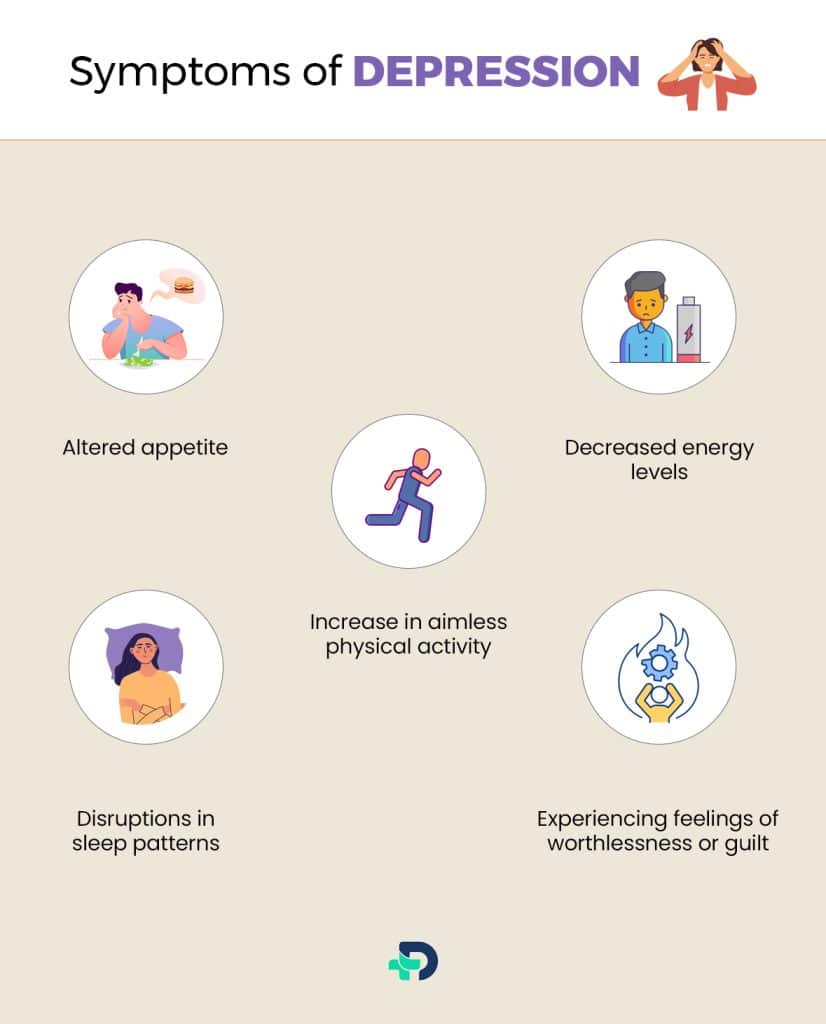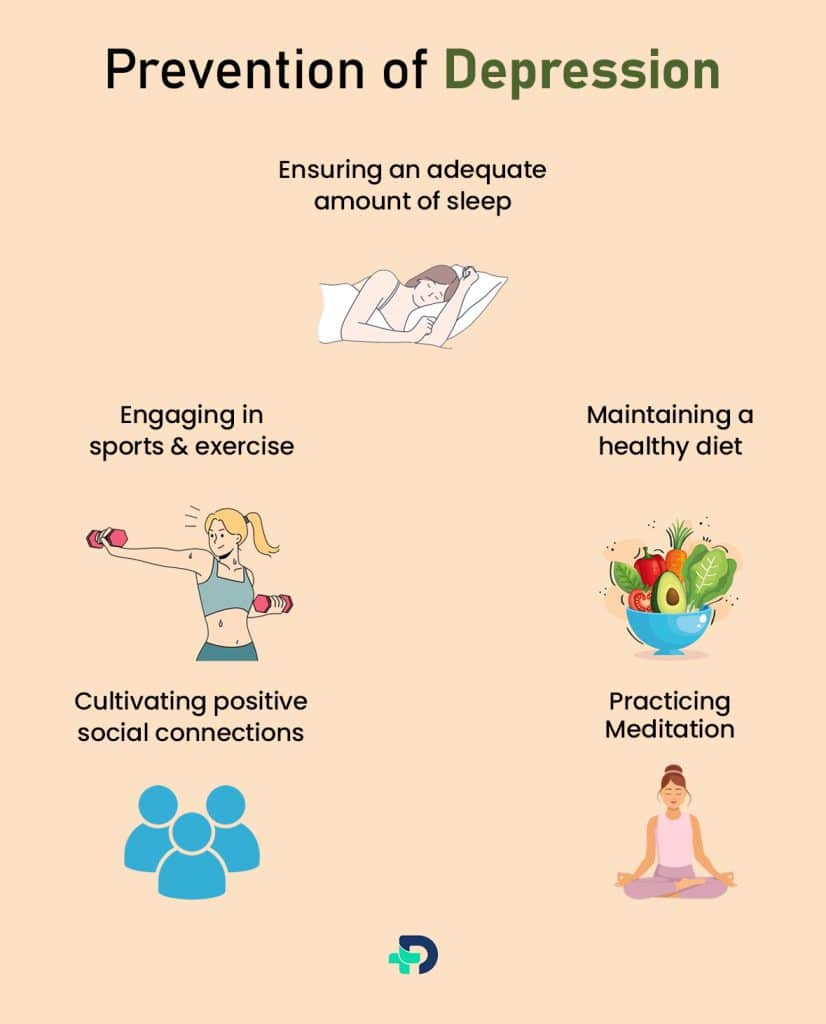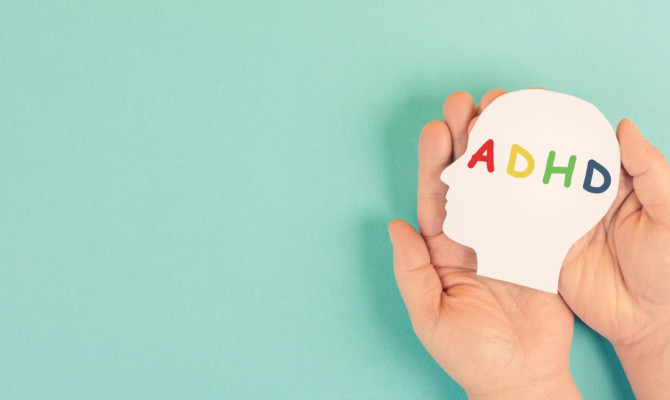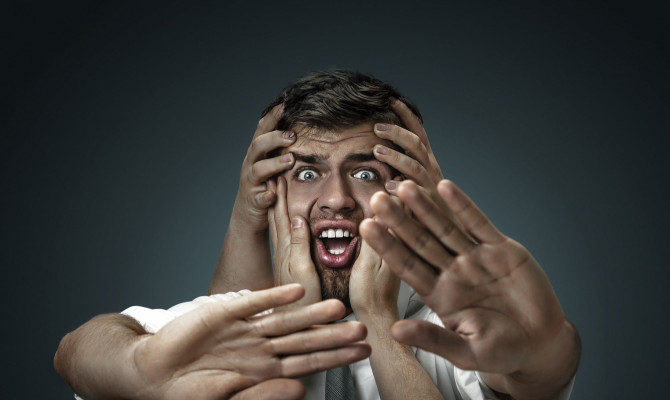Depression : What Do We Need to Know

- Depression
- 17 Aug 2023
Overview
What is Depression ?
Depression, also known as major depressive disorder, is a prevalent and severe medical condition that impacts one’s emotions, thoughts, and behavior, resulting in feelings of sadness, a lack of interest in previously enjoyable activities, and can contribute to various emotional and physical challenges, ultimately impairing one’s ability to function effectively both in professional and personal domains.1Overview| Researched based study from Psychiatry.org

Types
Major types of Depression
There are 4 major types of Depression
- Situational depression
- Biological depression
- Psychological depression
- Existential depression
In detail the types of depression can be explained as follow:
Situational depression
- This involves experiencing intense sadness due to adverse events or isolating circumstances.
- It is a highly prevalent phenomenon.
- While these feelings are typically considered normal, if they persist beyond a few weeks or if a person begins to have suicidal thoughts, it may indicate a different type of depression.
Biological depression
- This originates from an imbalance in neurotransmitters (e.g., serotonin) as well as hormones, such as estrogen and thyroxine, which impact both mood and physiological functions.
- Consequently, these biochemical alterations can hinder daily activities, leading to increased stress levels, negative thought patterns, and diminished self-esteem.
Psychological depression
- Psychological factors, including unrealistic expectations, distorted perspectives, negative self-talk, and dysfunctional relationships, are closely associated with depression.
- The factors contribute to developing and maintaining depressive symptoms, influencing one’s mental well-being and interpersonal dynamics.2Types| Researched based study from Nlm.nih.gov
Existential depression
- This can be triggered by a positive event, such as the fulfillment of a long-awaited goal, as individuals may anticipate that achieving it will bring purpose, contentment, and a sense of well-being to their lives.
- However, if the expected happiness or fulfillment does not materialize, individuals may experience a sense of disappointment, feeling that they have wasted their time.
Other forms of Depression
There are seven common forms of depression, including:
Major Depressive Disorder (MDD)
- Characterized by persistent and severe depressive symptoms that interfere with daily life.
Persistent Depressive Disorder (PDD)
- Also known as dysthymia, it involves chronic low-grade depressive symptoms that last for at least two years.
Seasonal Affective Disorder (SAD)
- A type of depression that occurs during specific seasons, typically during the winter months when there is less sunlight.7Types| Researched based study from Nlm.nih.gov
Postpartum Depression
- Experienced by some women after giving birth, this type of depression involves intense feelings of sadness, anxiety, and exhaustion.
Bipolar Disorder
- It is distinguished by periods of depression interspersed with periods of mania or euphoria.
Psychotic Depression
- A serious episode of depression accompanied with psychotic symptoms like delusions or hallucinations.
Atypical Depression
- This kind of depression is distinguished by mood reactivity, which means that the person’s mood may momentarily improve in reaction to encouraging circumstances.
Symptoms

Symptoms of Depression
- Altered appetite
- Either weight loss or gain that is unrelated to intentional dieting
- Disruptions in sleep patterns (insomnia or excessive sleep)
- Decreased energy levels
- Increase in aimless physical activity
- Experiencing feelings of sadness or a persistent depressed mood
- Diminished sense of interest or pleasure in previously enjoyable activities
- Experiencing feelings of worthlessness or guilt
- Struggling with difficulties in thinking, concentration, and decision-making
- Having thoughts related to death or suicide.1Symptoms| Researched based study from Psychiatry.org
Causes
Causes of Depression
There are two main categories in which the causes can be classified – biology and psychology.
Biological causes
Biological factors can potentially contribute to the development of depression, which involve:
- Genetics
- Hormones
- Neurotransmitters.4Causes| Researched based study from Health.wa.gov.au
Genetics
- The presence of depression within families implies that individuals may inherit genetic predispositions that increase their susceptibility to developing the condition.4Causes| Researched based study from Health.wa.gov.au
- While many individuals may inherit a predisposition to depression, a significant portion of them may never experience a depressive illness.
Hormones
- During depression, hormonal changes occur, and the brain undergoes alterations both before and during a depressive episode.4Causes| Researched based study from Health.wa.gov.au
- Specific regions of the brain are impacted, potentially leading to excessive or inadequate production of certain hormones.
- The hormonal imbalances could contribute to the manifestation of various depressive symptoms.
Neurotransmitters
- In the brain, nerve cells communicate through neurotransmitters, which are specific chemical substances.
- It is thought that a few of these networks of neurotransmitters become less active in depressive situations.
- The disruption affects specific brain regions responsible for regulating functions such as sleep, appetite, sexual drive, and potentially mood.
Psychological causes
Psychological causes involve:
- Loss
- Thinking patterns
- Feelings of failure
- Stressful life events.4Causes| Researched based study from Health.wa.gov.au
Loss
- At times, individuals go through situations involving loss, which can trigger depression.
- Loss can encompass various experiences, such as the death of a loved one, separation from someone significant, unemployment, or the termination of a friendship.4Causes| Researched based study from Health.wa.gov.au
Thinking patterns
Depression is associated with certain patterns of thinking, which can include:
- Focusing excessively on the negative aspects of situations.
- Taking responsibility for negative events while disregarding positive ones.
Feelings of failure
These can also contribute to depression.
- Some individuals may tie their happiness to specific achievements, such as academic success, securing a desired job, financial gains, or finding a life partner.
- If they are unable to accomplish these goals, they may perceive it as a personal failure, which can intensify or trigger depression.
Stressful life events
- Additionally, a depressive episode may start as a result of a series of life situations that are stressful.
- Examples of such events include unemployment, financial concerns, and other challenging circumstances.4Causes| Researched based study from Health.wa.gov.au
Prevalence
Prevalence of Depression
- Around 3.8% of the population is estimated to experience depression.
- The number includes 5% of adults (with a breakdown of 4% for men and 6% for women) and 5.7% of adults over 60 years old.
- The global prevalence of depression stands at approximately 280 million individuals.
- Depression is about 50% more prevalent in women compared to men.
- Furthermore, over 10% of pregnant women and those who have recently given birth experience depression worldwide.
- Tragically, more than 700,000 individuals lose their lives to suicide annually, making it the fourth leading cause of death among individuals aged 15 to 29.5Prevalence| Researched based study from Who.int
Diagnosis
Diagnosis of Depression
Although there is no specific laboratory test that can definitively diagnose depression, there is a standard procedure that is followed to determine a diagnosis.
- A doctor will typically conduct a comprehensive evaluation, which may include blood tests, to eliminate any underlying medical conditions that could be contributing to the symptoms of depression.
To receive a diagnosis of major depressive disorder (MDD), individuals should experience a minimum of five specific key symptoms from the following consistently for at least two weeks:7Diagnosis| Researched based study from Mayoclinic.org
- Depressive mood
- Altered appetite
- Difficulty concentrating
- Irritability and restlessness
- Persistent fatigue
- Feelings of worthlessness or excessive guilt
- Recurrent suicidal ideation or preoccupation with death
- Sleep disturbances
- Diminished interest in previously enjoyed activities
- A sense of detachment or slowed movement
Treatment
Treatment of Depression
Treatment with Medications
Antidepressants
- Antidepressants encompass a range of medications and drug categories that can effectively elevate mood and enhance motivation.8Treatment| Researched based study from Nlm.nih.gov
- They are frequently combined with psychological treatments. However, it typically takes several days or weeks for antidepressants to exhibit their therapeutic effects.
- In cases of acute depression, these medications need to be taken daily for several weeks or months before noticeable improvements are observed.
- Continuation treatment, lasting four to nine months, often follows this initial phase of treatment.
- During the concluding stages of treatment, the dosage of antidepressants is gradually tapered off over several weeks.
- Abruptly discontinuing antidepressant medication can result in temporary difficulties such as sleep disturbances, nausea, or restlessness. Therefore, it is important to follow a gradual and supervised approach when discontinuing antidepressants to minimize potential withdrawal symptoms.
Herbals
- St. John’s wort is widely recognized as one of the most common and well-known herbal medicines used for treating depression.8Treatment| Researched based study from Nlm.nih.gov
- It is primarily utilized for mild depression, although it is also employed in some cases of moderate depression.
- While herbal remedies can offer potential benefits, they also carry the risk of side effects and interactions with other medications.
- It is crucial to consult with a doctor before taking St. John’s wort or any herbal product for the treatment of depression.
Psychological treatment
- It typically involves engaging in in-depth discussions and participating in behavioral exercises.
Cognitive behavioral therapy
- In the context of depression, negative thought patterns such as self-doubt and guilt can exacerbate the problem.
- Cognitive behavioral therapy (CBT), which involves cognitive therapy and behavioral therapy, aims to gradually break these patterns, leading to improved self-perception and overall well-being.8Treatment| Researched based study from Nlm.nih.gov
- Cognitive therapy focuses on the understanding that problems are often influenced by the significance individuals attribute to things and situations. By changing one’s perspective, significant progress can be made.
- The objective of behavioral therapy is to identify harmful behavior patterns, actively work on them, and bring about positive changes.
Psychoanalytic approaches
- The approaches operate on the premise that unresolved conflicts, buried in the unconscious mind, can contribute to the development of depression.
- The primary objective is to uncover and address undisclosed issues through dialogue with a therapist.
- Individuals undergoing psychoanalytic therapy must be willing to confront potentially distressing past experiences.
Systemic therapy
- It emphasizes the significance of interpersonal relationships, such as those within families, friendship circles, or workplaces.
- The relationships can contribute to the onset of depression.
- The therapy focuses on enhancing communication and dynamics within these relational systems, with the goal of alleviating depressive symptoms.
Additional therapies
Relaxation techniques
- Progressive easing of muscles, autogenic training, therapy with music, and yoga are a few techniques that have shown promise in the treatment of mild to moderate depression.
Sports
- Jogging, biking, swimming, or trekking demonstrated efficacy in reducing depressive symptoms or lowering the likelihood of developing depression.
Light therapy
- It is a therapeutic approach utilized in the management of seasonal affective disorder, which is a type of depression that affects certain individuals during the months with less daylight.
- Light therapy entails sitting in front of a specialized bright light, typically a light therapy device, for approximately thirty minutes each morning.8Treatment| Researched based study from Nlm.nih.gov
Sleep deprivation therapy
- It is a treatment method that involves intentionally depriving the patient of sleep for a designated period.
- It typically involves staying awake throughout the night and then allowing the patient to sleep the following night.
- The underlying belief is that sleep deprivation can induce metabolic changes in the brain, potentially resulting in an improvement in mood.
Electroconvulsive therapy (ECT)
- With the patient under general anesthesia, it is often given in a hospital setting.
- Electrodes are positioned on the patient’s head, and a brief surge of electrical current is transmitted through the brain, triggering a controlled seizure.
- It is typically considered a treatment option for individuals with clinical depression when other interventions have proven ineffective.
Risk
Who are at risk?
- While depression can occur at any stage of life, it frequently emerges during adulthood.
- Anyone with thyroid disease or taking certain medications to treat physical illnesses.
- a history of depression in one’s life or in their family.
- Experiencing major negative life changes, trauma, or high levels of stress.
- Older age people with other significant medical conditions, including cancer, Parkinson’s, etc.
- Depression is more frequently diagnosed in women than in men.9Risk| Researched based study from Nimh.nih.gov
Prevention

Prevention of Depression
- Ensuring an adequate amount of sleep.
- Engaging in sports and exercise.
- Practicing meditation or relaxation exercises.10Prevention| Researched based study from Biomedcentral.com
- Cultivating positive social connections.
- Maintaining a healthy diet.
- Ensuring early implementation of the most appropriate therapy to prevent the escalation of symptoms and the development of chronic depression.
- Engaging in screening procedures and preventative examinations for early detection.
- Participating in supportive training programs for patients and their families to develop the ability to recognize early warning signs of depression.
Prognosis
Prognosis of Depression
- Major depressive disorder carries a substantial risk of morbidity and mortality, particularly due to its association with suicide.
- However, with proper treatment, a significant reduction in symptoms can be achieved in 70-80% of individuals diagnosed with major depressive disorder.11Prognosis| Researched based study from Sciencedirect.com
- It is important to note that up to 50% of patients may not respond favorably to the initial treatment attempt.
- Poor prognoses are often observed in depressed patients who report severely stressful life events, with considerably worse outcomes associated with the reporting of three or more events.
- Pretreatment symptoms of irritability and psychosis may also be linked to poorer treatment outcomes.
Any feedback on this article?
 This Articles content was accurate
This Articles content was accurate Very Informative Article
Very Informative Article I have a question or a comment
I have a question or a comment
 This article contains inaccurate content
This article contains inaccurate content This article was not helpful
This article was not helpful I have a question or a comment
I have a question or a comment
We appreciate your helpful feedback!
Checkout our social pages
References
-
American Psychiatric Association
What Is Depression? | Overview
-
National Library of Medicine
Major Depressive Disorder | Types
-
American Psychiatric Association
Depression | Symptoms
-
Center for Clinical Intervention
What Causes Depression? | Causes
-
World Health Organization
Depressive disorder (depression) | Prevalence
-
National Library of Medicine
Various forms of depression | Types
-
Mayo Clinic
Depression (major depressive disorder) | Diagnosis
-
National Library of Medicine
Treatments for depression | Treatment
-
National Institute of Mental Health
Depression | Risk
-
BMC Public Health
Exercise interventions for the prevention of depression: a systematic review of meta-analyses | Prevention
-
Science Direct
Life events and treatment prognosis for depression: A systematic review and individual patient data meta-analysis | Prognosis



































